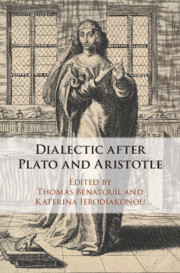Book contents
- Dialectic after Plato and Aristotle
- Dialectic after Plato and Aristotle
- Copyright page
- Contents
- Contributors
- Preface
- Abbreviations
- Introduction: Dialectics in Dialogue
- Chapter 1 Megara and Dialectic
- Chapter 2 Dialectic in the Early Peripatos
- Chapter 3 Epicurus on Dialectic
- Chapter 4 Dialectic as a Subpart of Stoic Philosophy
- Chapter 5 Stoic Dialectic and Its Objects
- Chapter 6 Dialectic in the Hellenistic Academy
- Chapter 7 Pithana and probabilia
- Chapter 8 Terminology and Practice of Dialectic in Cicero’s Letters
- Chapter 9 The Sceptic’s Modes of Argumentation
- Chapter 10 Galen and Middle Platonists on Dialectic and Knowledge
- Bibliography
- Index of Names
- Index of Passages
Chapter 10 - Galen and Middle Platonists on Dialectic and Knowledge
Published online by Cambridge University Press: 26 October 2018
- Dialectic after Plato and Aristotle
- Dialectic after Plato and Aristotle
- Copyright page
- Contents
- Contributors
- Preface
- Abbreviations
- Introduction: Dialectics in Dialogue
- Chapter 1 Megara and Dialectic
- Chapter 2 Dialectic in the Early Peripatos
- Chapter 3 Epicurus on Dialectic
- Chapter 4 Dialectic as a Subpart of Stoic Philosophy
- Chapter 5 Stoic Dialectic and Its Objects
- Chapter 6 Dialectic in the Hellenistic Academy
- Chapter 7 Pithana and probabilia
- Chapter 8 Terminology and Practice of Dialectic in Cicero’s Letters
- Chapter 9 The Sceptic’s Modes of Argumentation
- Chapter 10 Galen and Middle Platonists on Dialectic and Knowledge
- Bibliography
- Index of Names
- Index of Passages
Summary
- Type
- Chapter
- Information
- Dialectic after Plato and Aristotle , pp. 320 - 349Publisher: Cambridge University PressPrint publication year: 2018
- 5
- Cited by

